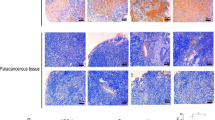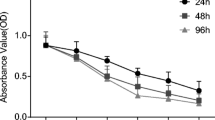Abstract
Objective
The aim of the study was to investigate the effect of c-Jun N-terminal protein kinase (JNK) signaling pathway on influencing the sensitivity to radiotherapy of human nasopharyngeal carcinoma CNE cells.
Methods
Human nasopharyngeal carcinoma CNE multicellular spheroids (MCS) were constructed with three dimensional cell culture methods. Western blot was employed to analyze the activity of JNK signaling pathway in MCS after X-ray irradiation, and the expression of caspase-3 protein before and after using SP600125 (a special inhibitor of JNK). X-ray induced cell apoptosis in MCS before and after treated with SP600125 were detected by TUNEL.
Results
The level of JNK phosphorylation in MCS was a dynamic course after radiation, and there was a phosphorylation peaks at 2 h later, the apoptotic rate of MCS (P < 0.05) and the expression of caspase-3 protein (P < 0.05) were significantly increased after treated with SP600125.
Conclusion
The transient activation of JNK played a important role in sensitivity to radiotherapy of CNE MCS via mediating survival signals, blocking this pathway accelerate cell apoptosis, which may be related to the increased expression of caspase-3.
Similar content being viewed by others
References
Topsch J, Scholz M, Mueller-Klieser W. Radiobiological characterization of human tumor cell multilayers after conventional and particle irradiation. Radiat Res, 2007, 167: 645–654.
Walker J, Martin C, Callaghan R. Inhibition of P-glycoprotein function by XR9576 in a solid tumour model can restore anticancer drug efficacy. Eur J Cancer, 2004, 40: 594–605.
Shinomiya N. New concepts in radiation-induced apoptosis: “premitotic apoptosis” and “postmitotic apoptosis”. J Cell Mol Med, 2001, 5: 240–253.
Tournier C, Hess P, Yang DD, et al. Requirement of JNK for stressinduced activation of the cytochrome c-mediated death pathway. Science, 2000, 288: 870–874.
Hayakawa J, Ohmichi M, Kurachi H, et al. Inhibition of extracellular signal-regulated protein kinase or c-Jun N-terminal protein kinase cascade, differentially activated by cisplatin, sensitizes human ovarian cancer cell line. J Biol Chem, 1999, 274: 31648–31654.
Sánchez-Pérez I, Perona R. Lack of c-Jun activity increases survival to cisplatin. FEBS Lett, 1999, 453: 151–158.
Lewin B. Genes, EdVIII. London: Prentice Hall Press, 2004. 936.
Perona R, Sánchez-Pérez I. Control of oncogenesis and cancer therapy resistance. Br J Cancer, 2004, 90: 573–577.
Dent P, Yacoub A, Fisher PB, et al. MAPK pathways in radiation responses. Oncogene, 2003, 22: 5885–5896.
Author information
Authors and Affiliations
Corresponding author
Rights and permissions
About this article
Cite this article
Wei, L., Mei, B. Role of JNK signaling pathway in sensitivity to radiotherapy of nasopharyngeal carcinoma. Chin. -Ger. J. Clin. Oncol. 11, 279–281 (2012). https://doi.org/10.1007/s10330-011-0951-z
Received:
Revised:
Accepted:
Published:
Issue Date:
DOI: https://doi.org/10.1007/s10330-011-0951-z




